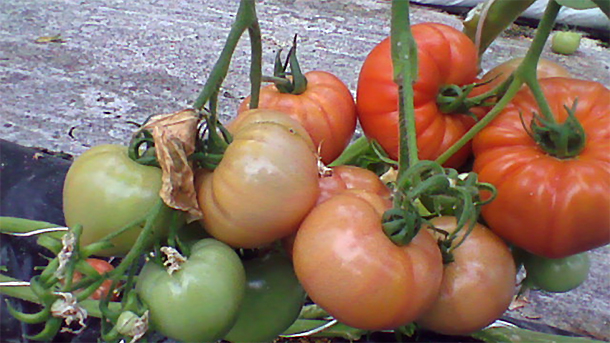Hydroponic technology is used to grow fruit and vegetables without the use of soil and it is not very popular in Bulgaria. There is enough arable land with excellent qualities in this country but the alternative method attracts attention due to a significant advantage – productivity that is up to 10 times higher in comparison to traditional agriculture.
A newspaper in Bulgaria recently wrote about a curious experiment with hydroponic technology in the region of Sliven. The local thermal electric plant has decided to produce fruit and vegetables this way. Initially the goal was for the greenhouse of the power plant to produce vegetables for the workers but the good results and high yield have made the plant sell its agricultural products on the local market.

“Growing vegetables using hydroponic technology is easy in a thermal-electric plant. We have heating, electricity, and water and we just need to use them,” engineer Pavlin Kostov says and adds:
"The main advantage of the greenhouse is seen in the winter when using available heat we are able to maintain temperatures that other greenhouses cannot achieve. Even when temperature outside drops to minus 10-15 degrees, we keep 20-25 degrees in our greenhouse. We can produce vegetables year-round but in the summer we stop work for two months when local agricultural producers enter the market. Sliven is a region known for its horticultural traditions.”
How exactly are vegetables grown using this technology?
 “Plants are placed in a substrate called agroperlit - a mineral that is found in Bulgaria,” the engineer says. “All the necessary nutrients are fed to the plants through drip irrigation and the whole process is controlled by a computer. We analyze what nutrients we provide and what part of them is used by the plants and this way we accurately determine the needs of the tomatoes. When you plant tomatoes in soil you usually do not know the exact contents of the soil. Often the soil is poor in magnesium or calcium and fertilizers do not always meet the exact needs of the plants. I can say that the quality of our tomatoes is very high and they taste like those grown in the past.”
“Plants are placed in a substrate called agroperlit - a mineral that is found in Bulgaria,” the engineer says. “All the necessary nutrients are fed to the plants through drip irrigation and the whole process is controlled by a computer. We analyze what nutrients we provide and what part of them is used by the plants and this way we accurately determine the needs of the tomatoes. When you plant tomatoes in soil you usually do not know the exact contents of the soil. Often the soil is poor in magnesium or calcium and fertilizers do not always meet the exact needs of the plants. I can say that the quality of our tomatoes is very high and they taste like those grown in the past.”
Engineer Kostov also told us the TPP planned to enlarge the greenhouse but added that small agricultural producers like them were not protected in any way by the state, so entrepreneurship remained risky.
The method of pollination used in the greenhouse of the TPP is also interesting.
"We use bumblebees to pollinate the tomatoes. There are two ways to pollinate tomatoes in a greenhouse. The cheaper one is spraying the flower with hormonal agents. The other way which is much more natural is using bees. The bumblebees live in hives made of paper and pollinate the plants in a natural way,” says engineer Pavlin Kostov.
English version: Alexander Markov
In the week of St. Andrew’s Day (also known as Bears’ Day or Mechkinden), WWF is drawing attention to six orphaned bear cubs who have been given a second chance at life. The initiative is part of the "Subscribe to Nature" campaign and..
For the 30th consecutive year, the Bulgarian Posts organize a contest for the most beautiful letter to Santa Claus. Letters must be sent by 18 December with a stamped envelope "For Santa", the sender's address indicated and postage paid. All..
The Varna Regional Library "Pencho Slaveykov" has acquired a humanoid robot. It was unveiled by the library's director, Radka Kalcheva, during the celebration of the 20th anniversary of the library's American Corner, in the presence of Eric Brasel, the..
Modernizing critical thinking skills, fact-checking skills and media literacy are essential for society, especially for young people in Bulgaria - the..

+359 2 9336 661
